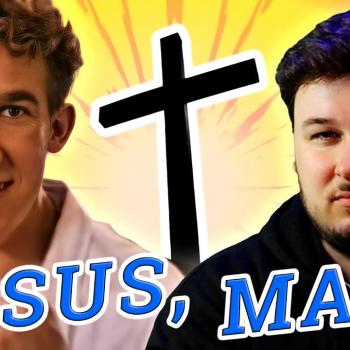As regular readers of this site know, public school students don’t have to say the Pledge of Allegiance in school.
They have every right to stand silently or remain seated during the Pledge. Some students choose that option because they’re atheists who don’t believe we’re a nation “under God” while others don’t because they know we don’t actually have “liberty and justice for all.” Whatever the reason, students can’t be punished for their refusal to say the Pledge.

It took a couple of important legal battles to solidify that right — there’s an excellent podcast explaining the details — but that’s the law…
Except in two states: Florida and Texas. (It’s always Florida and Texas, isn’t it?)
In those states, the law says students can only get out of saying the Pledge if they have their parents’ permission.
What happens if you’re a student who doesn’t want to say the Pledge but you don’t have the support of your parents? Too bad. You’re out of luck.
There have been lawsuits in both states challenging those laws.
In Texas, in 2018, a case was settled without deciding that question. In Florida, in 2008, however, the 11th Circuit Court of Appeals ruled narrowly in favor of a particular student who didn’t want to say the Pledge… but ultimately allowed the law to stand. Parents still had power.
The rights of students and the rights of parents — two different sets of persons whose opinions can often clash — are the subject of a legislative balance in the statute before us. The State, in restricting the student’s freedom of speech, advances the protection of the constitutional rights of parents: an interest which the State may lawfully protect the student’s freedom of speech, advances the protection of the constitutional rights of parents…
…
… we also recognize that a parent’s right to interfere with the wishes of his child is stronger than a public school official’s right to interfere on behalf of the school’s own interest… this Court and others have routinely acknowledged parents as having the principal role in guiding how their children will be educated on civic values.
…
We conclude that the State’s interest in recognizing and protecting the rights of parents on some educational issues is sufficient to justify the restriction of some students’ freedom of speech.
Now, Caroline Mala Corbin, a Professor of Law at the University of Miami who has written extensively on church/state separation, has published a paper that will soon appear in the Indiana Law Journal picking apart the problems with that 11th Circuit ruling.
I won’t go into all the details here — the paper isn’t written for a lay audience, though it’s easy to read and really gets to the heart of why students alone should be deciding whether or not to stand for the Pledge. But essentially, Corbin argues that the justifications Florida and Texas have used in giving parents the authority to force their kids to say the Pledge make no sense and ought to be overturned.
… forcing students to pledge against their will exemplify all the harms of compelled speech… the claim that parents’ constitutional right to control the upbringing of their children justifies making the right to refuse contingent on parental permission misunderstands the nature of the parents’ right: it is meant to protect parents from the state, not to empower parents to trample on the rights of their children.
…
In short, a law that demands recitation of the pledge also means it demands affirmation of some viewpoints over others — a compulsion anathema to free speech.
Corbin admits that the courts have allowed parents’ wishes to trump their kids’ desires in certain situations — like when it comes to a minor having an abortion (whether or not you think that’s ethical). But when it comes to the Pledge, there’s no good reason to give parents veto power over their kids’ wishes.
… the decision whether to participate or not participate in the Pledge of Allegiance does not carry potentially serious consequences. Even when the Supreme Court has allowed states mandate parental guidance for important decisions, the Court has rejected handing parents veto power when children’s own constitutional rights were also at stake. It makes even less sense to award parents control over students’ speech in school when minors are mature enough to make their own decisions. Indeed, exercising this decisionmaking is crucial to developing their capacities as future citizens — the avowed goal of public school education.
All of this is sensible. There are solid reasons judges should overturn these laws if they’re ever challenged in the future. No students should have to say the Pledge if they don’t want to, and it shouldn’t matter if their parents agree with them.
(Image via Shutterstock)




It’s Moving Day for the Friendly ..."
It’s Moving Day for the Friendly ..."
It’s Moving Day for the Friendly ..."
It’s Moving Day for the Friendly ..."